Key takeaways:
- Open-source contributions enhance personal and professional growth through collaboration and shared knowledge.
- Participating in open-source fosters skill development and helps build a network, often leading to job opportunities.
- Challenges include navigating complex documentation, handling feedback, and fostering supportive community dynamics.
- The future of open-source looks promising with increased inclusivity, mentorship programs, and technology facilitating contributions.
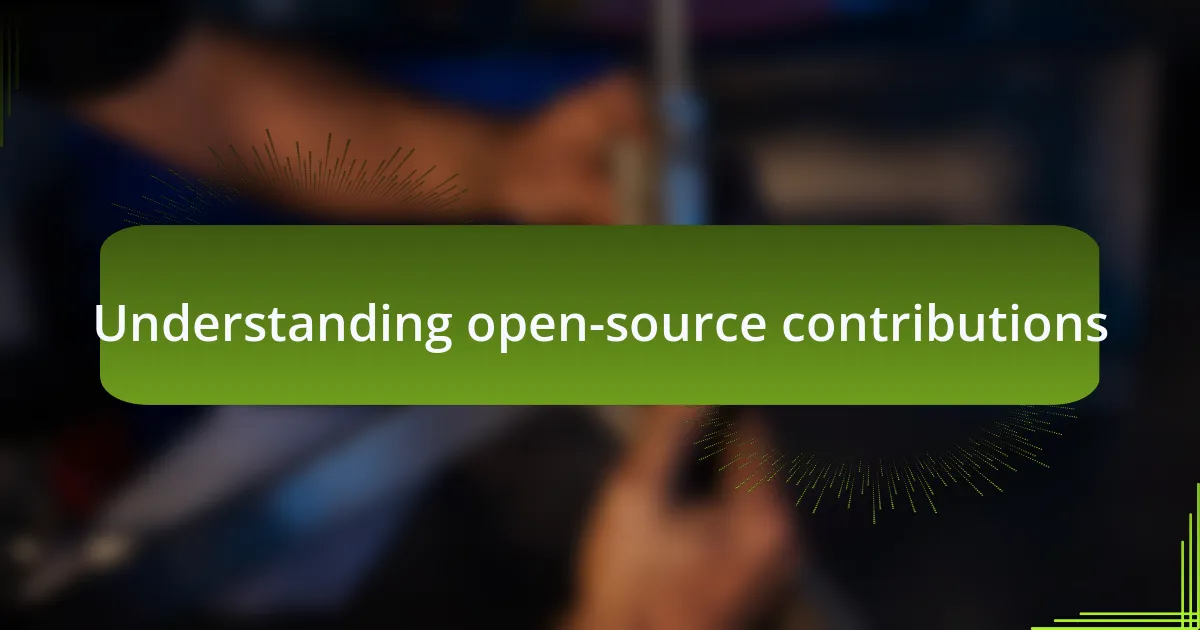
Understanding open-source contributions
Open-source contributions are more than just coding; they embody collaboration and community. I remember my first experience diving into an open-source project. The thrill of knowing that my contributions could help a global community resonate with me deeply. Have you ever felt that rush of excitement when your work positively impacts others? It’s a unique feeling that fuels further engagement.
When I think about open-source contributions, I see them as building blocks for learning and growth. I’ve often found myself picking up new skills simply by reviewing others’ code or engaging in discussions about project improvements. Isn’t it amazing how a single line of code or a thoughtful suggestion can spark a new idea? That’s the beauty of open-source: it encourages innovation through shared knowledge.
Moreover, open-source contributions are a testament to the power of transparency and accessibility in technology. For example, when I participated in developing a tool that many relied on, it made me realize how the community comes together to support and enhance a project. Have you ever thought about how much richer our technological landscape could be if more people embraced this collaborative spirit? The possibilities truly are limitless.
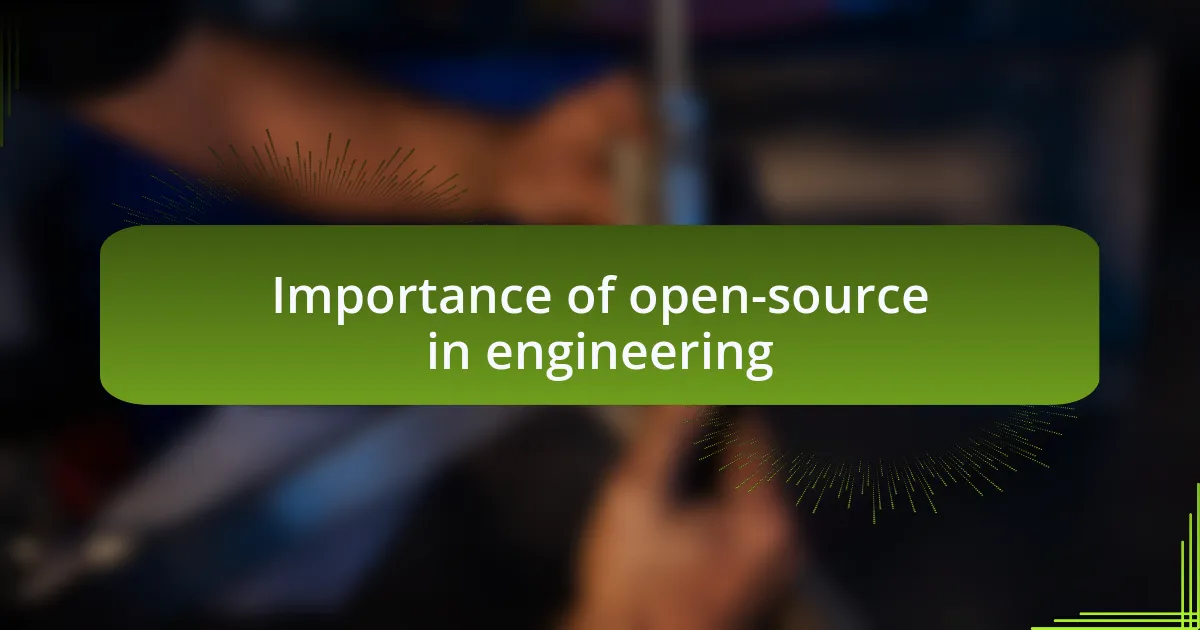
Importance of open-source in engineering
Open-source plays a pivotal role in engineering by fostering collaboration among diverse talent. In my own journey, I’ve collaborated with engineers across different countries, each bringing unique perspectives to our projects. Isn’t it fascinating how this cultural exchange enhances the quality of our work? Through open-source, we break down geographical barriers, allowing innovative ideas to flow freely, which often leads to groundbreaking solutions.
The impact of open-source on skill development cannot be overstated. I vividly recall how my engagement in a community-driven project unveiled new programming techniques I hadn’t encountered before. It felt like stepping into an expansive library of knowledge, where every contribution enriched my understanding. How often do we get a chance to learn directly from experienced developers while simultaneously contributing our insights? This reciprocal learning environment accelerates both personal and professional growth.
Moreover, open-source serves as a catalyst for quality and reliability in engineering. I once contributed to an open-source library that underwent rigorous peer reviews, and witnessing this process firsthand was enlightening. Each critique was an opportunity to improve not just the code but my own understanding of best practices in development. This transparency fosters a sense of accountability and enhances the final product. Have you considered how such a robust review process could revolutionize the way we approach engineering challenges? I firmly believe that embracing open-source can elevate our engineering standards to new heights.
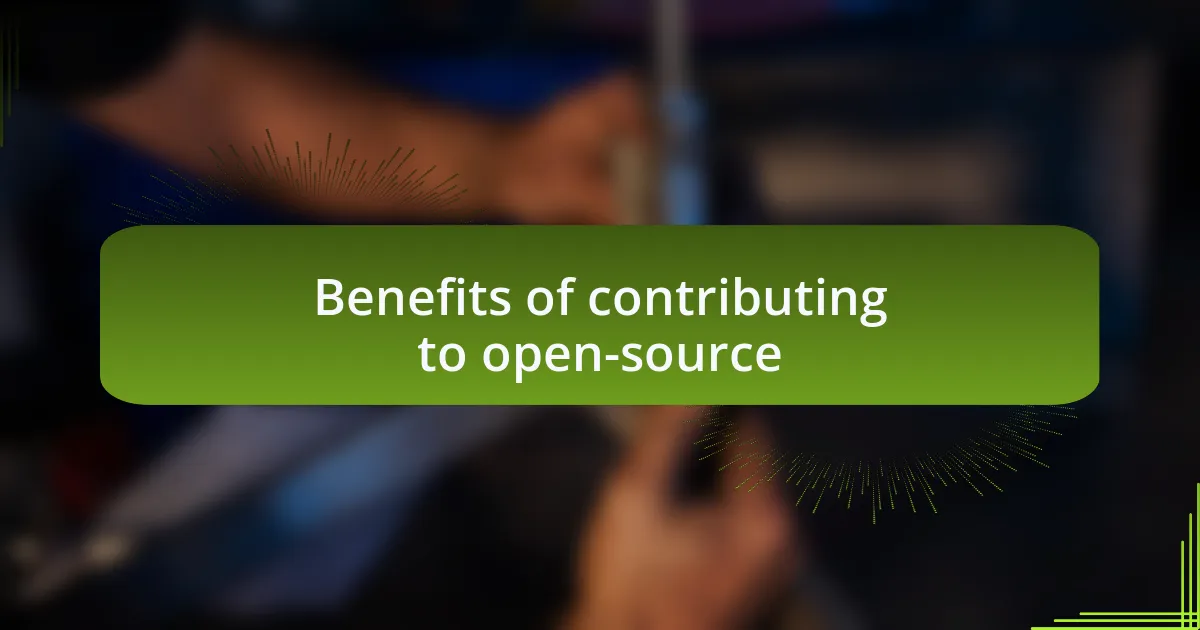
Benefits of contributing to open-source
Contributing to open-source offers a tremendous opportunity for networking and building relationships within the engineering community. I remember my first pull request; it wasn’t just about the code. Engaging with the maintainers and other contributors made me feel part of something larger. Have you ever noticed how easy it is to find mentors within these communities? Oftentimes, the relationships I’ve built have led to new job opportunities and collaborations.
Another significant benefit is the boost in visibility and reputation within the tech community. When I contributed to a well-known library, I was surprised by the recognition I received. It was rewarding to see my name on project documentation, validating my skills to peers and potential employers. Have you thought about how a single contribution could shape your career path? That recognition can catalyze professional growth and open doors you never anticipated.
Finally, engaging in open-source projects can be incredibly fulfilling. I often find joy in knowing that my efforts help others, particularly when I receive feedback from users who rely on the tools I’ve contributed to. It’s a unique pleasure to see my work make a difference in real-world applications. Have you ever experienced the satisfaction of solving someone else’s problem? That sense of purpose is invaluable and often motivates me to continue giving back to the community.
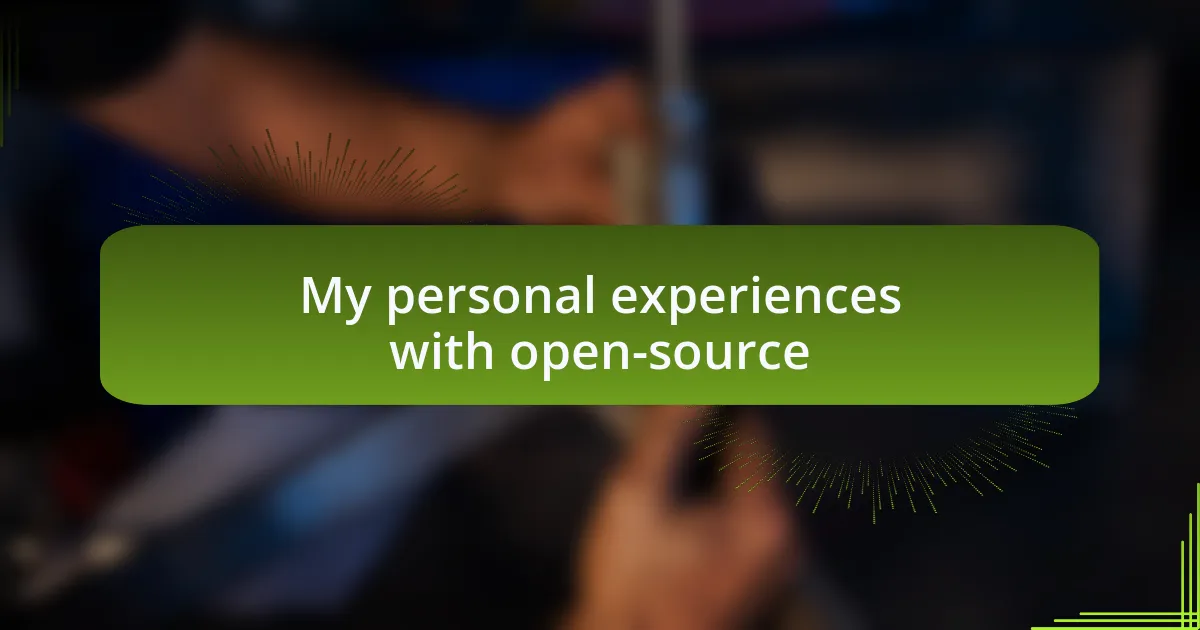
My personal experiences with open-source
I remember the first time I dove into an open-source project—it was like stepping into a vibrant world of collaboration. I had a specific feature in mind to enhance the software, and as I navigated the codebase, I felt a rush of excitement mixed with apprehension. Have you ever felt that exhilarating mix of fear and thrill when tackling something new? Completing that feature and submitting my pull request felt like crossing a significant threshold; it was a moment of growth that I continue to cherish.
One experience that stands out was when I collaborated with a diverse group of developers from around the globe on a data visualization tool. Even though we had different backgrounds, we united over the common goal of improving user experience. I often think about how those conversations opened my eyes to various perspectives; they broadened my understanding of what it means to create inclusive technology. Have you ever experienced the magic of teamwork in a setting where each member brings unique insights? It’s a beautiful reminder that innovation often flourishes when we collaborate and share our different viewpoints.
Then there’s the impact I’ve felt on my own confidence and skills. Each contribution, whether big or small, has played a role in shaping my technical acumen. I’ve encountered moments of frustration, especially when debugging complex issues, but overcoming those challenges has been incredibly rewarding. Isn’t it fascinating how every problem solved feels like a small victory? Reflecting on these experiences, I realize how much I owe to the open-source community for nurturing not just my abilities but my passion for technology itself.
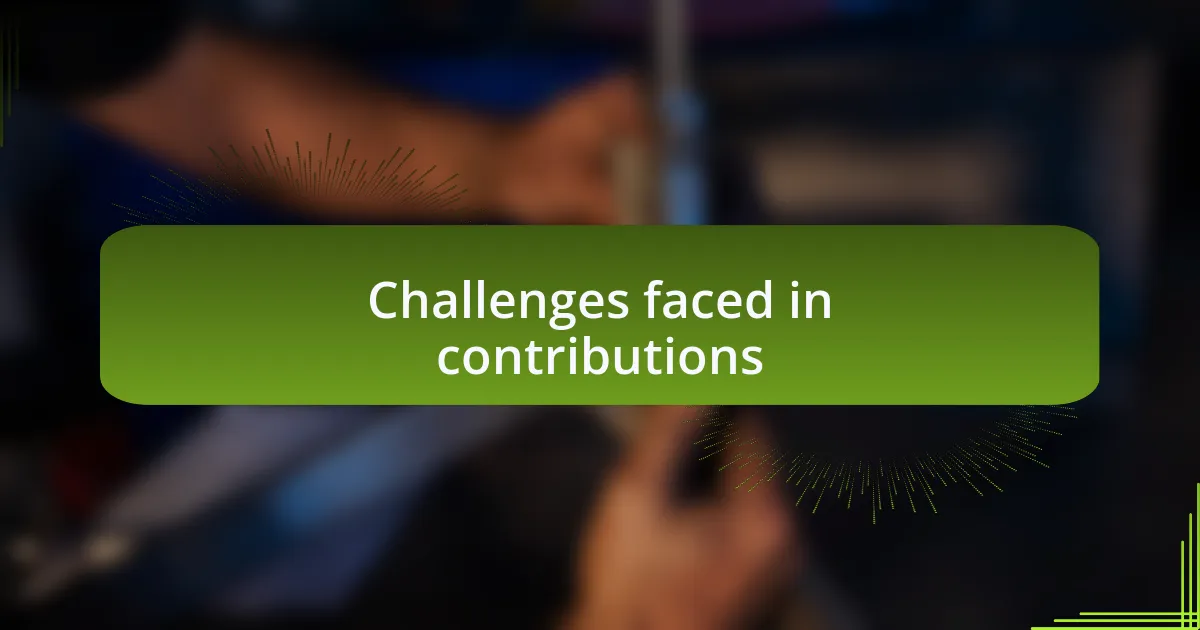
Challenges faced in contributions
One significant challenge I faced while contributing to open-source projects was navigating the vast array of documentation, often filled with technical jargon that was overwhelming. I remember spending hours trying to decipher whether a certain setup process was necessary for my contribution. Have you ever found yourself lost in a sea of instructions, unsure of where to begin? The complexity can be daunting, especially for newcomers who are eager to contribute but may not yet have the experience.
Another hurdle emerged when it came to receiving feedback. Initially, I was eager and hopeful after submitting my contributions, but I soon learned that not all responses are positive or constructive. I recall a time when my pull request was met with critiques that stung more than I anticipated. It’s a reality that many face: How do we learn to embrace criticism without letting it diminish our spirit? I found that focusing on the growth opportunity in feedback, rather than viewing it as a personal attack, helped shift my mindset.
Lastly, I faced the challenge of community dynamics. Sometimes, interactions were less than welcoming, especially in more established projects. I vividly remember engaging in a discussion that quickly turned unproductive; it was disheartening. It made me ponder: Are we fostering a supportive environment for all contributors? I realized that building relationships within the community requires patience and effort, yet it’s essential for creating a more inclusive atmosphere.
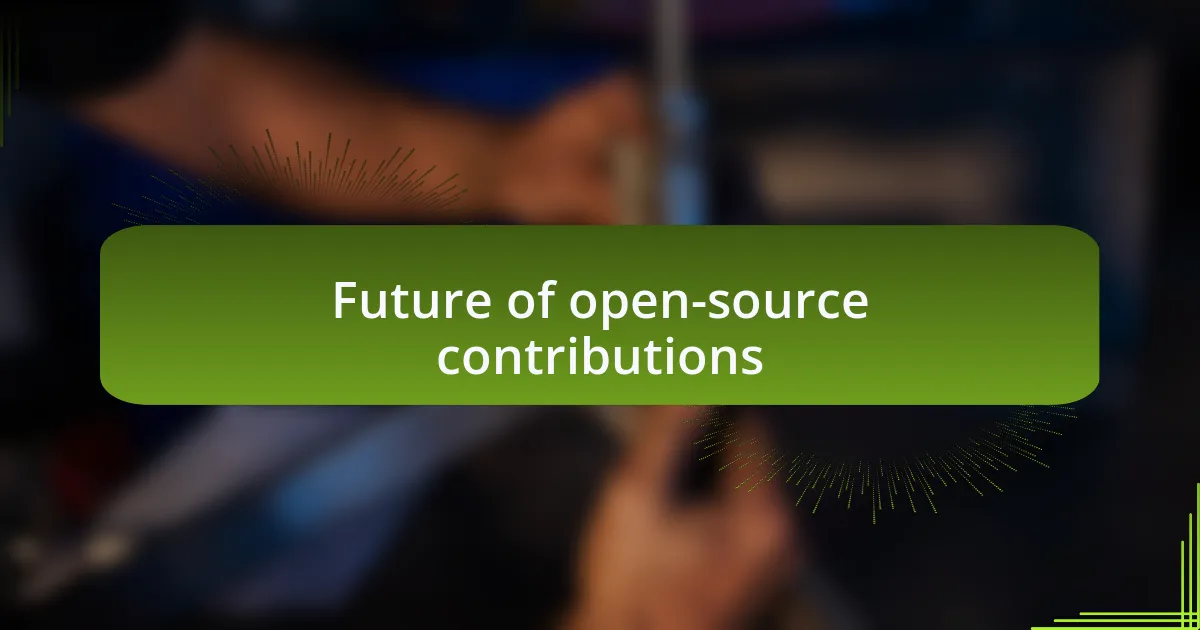
Future of open-source contributions
As I reflect on the future of open-source contributions, I see an exciting shift towards greater inclusivity. Projects are increasingly adopting mentorship programs, which I’ve found to be invaluable. When I first started, having a mentor made all the difference in my journey. It transformed my learning experience from daunting to motivating. I wonder how many new contributors could benefit from a similar supportive structure?
Looking ahead, I believe technology will play a crucial role in simplifying contributions. Tools such as AI-driven platforms for project management and collaboration are emerging. I recently experimented with one of these tools, and it significantly streamlined my workflow. Wouldn’t it be incredible if these advancements could help others overcome the barriers I faced early on?
Additionally, I envision a future where community-driven governance becomes the norm. The idea that contributors can have a voice in decision-making excites me. When I participated in a community vote on project priorities, it felt empowering to contribute my opinions. How much stronger could our projects be if every contributor felt heard and valued? This engaged approach not only enhances contributions but also fosters a sense of belonging among participants.